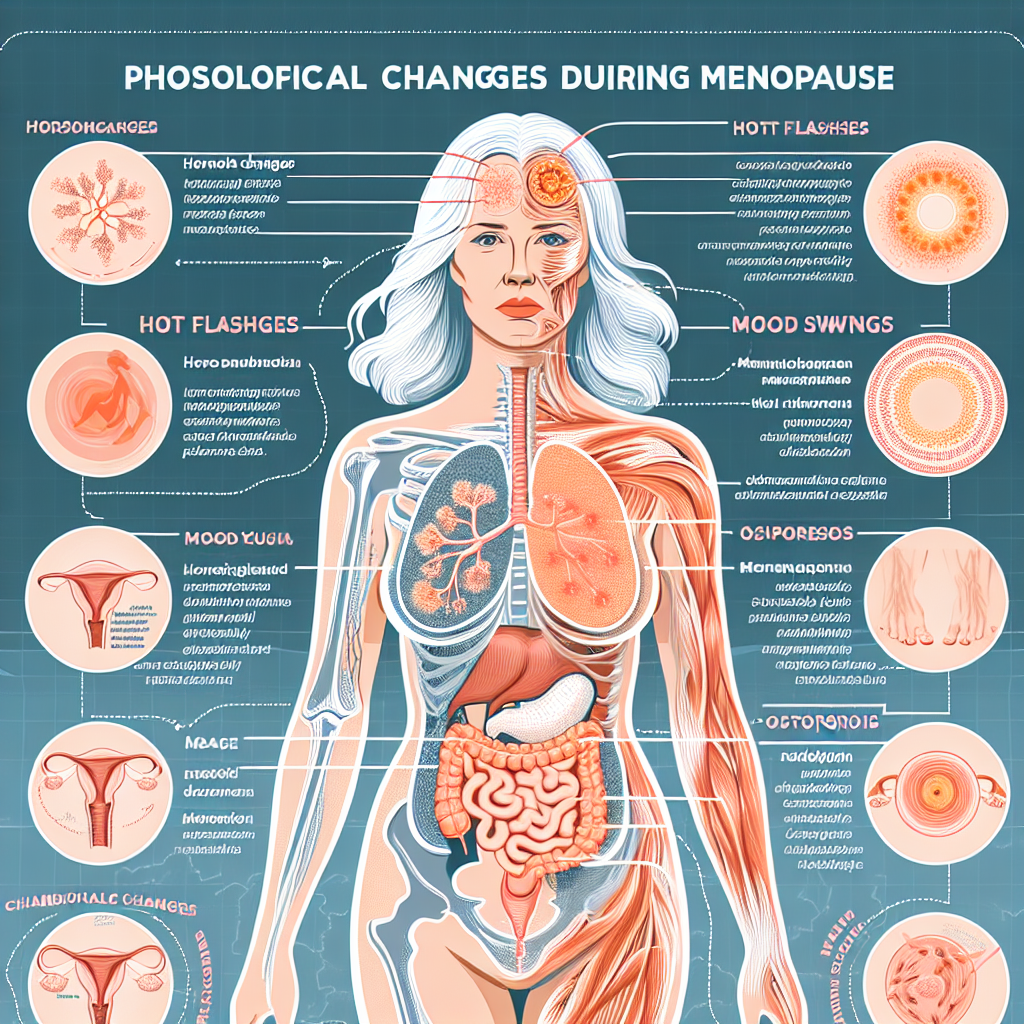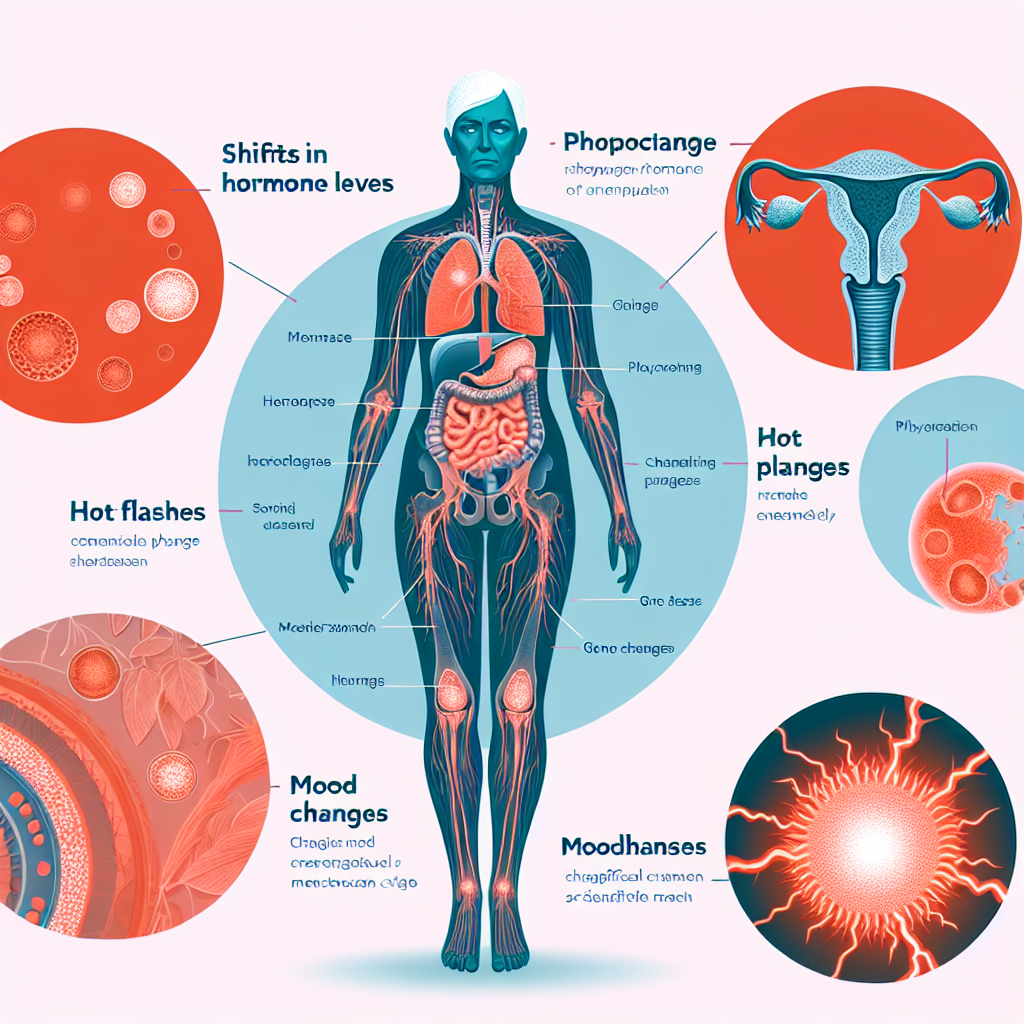What Really Happens to Your Body During Menopause

Discover what really happens to your body during menopause. Gain insights, understand the changes, and learn how to manage them effectively. Visit My Vibrant Vitality now.
Understanding the Hormonal Changes During Menopause
Menopause is a natural biological process that marks the end of a woman’s menstrual cycles. It is a significant milestone in a woman’s life, signifying the end of her reproductive years. However, the journey to this stage is often accompanied by a series of hormonal changes that can have profound effects on the body. Understanding these hormonal changes during menopause can help women better manage this transition and maintain their overall health and well-being.
The hormonal changes during menopause primarily involve two key hormones: estrogen and progesterone. These hormones play a crucial role in regulating the menstrual cycle and maintaining pregnancy. However, as a woman approaches menopause, the levels of these hormones begin to fluctuate and eventually decline. This decline is what triggers the onset of menopause and the various symptoms associated with it.
Estrogen, in particular, has a significant impact on the body. It helps regulate the menstrual cycle, promotes the growth of the uterine lining, and influences various bodily functions such as bone health, heart health, skin elasticity, and mood regulation. As estrogen levels decline during menopause, women may experience a range of symptoms. These can include hot flashes, night sweats, mood swings, sleep disturbances, and vaginal dryness. Additionally, the decline in estrogen can also increase the risk of osteoporosis, a condition that weakens the bones and makes them more prone to fractures.
Progesterone, on the other hand, prepares the uterus for pregnancy and helps maintain it. As progesterone levels drop during menopause, women may experience irregular periods before they eventually stop. Moreover, the decline in progesterone can also contribute to mood swings and sleep disturbances.
It’s important to note that these hormonal changes do not occur overnight. Instead, they take place over a period of years, in a phase known as perimenopause. During this time, hormone levels can fluctuate wildly, leading to irregular periods and other symptoms. Eventually, as hormone levels continue to decline, a woman will reach menopause, defined as the point when a year has passed since her last menstrual period.
While these hormonal changes are a natural part of aging, they can be challenging to navigate. However, understanding these changes can empower women to take proactive steps to manage their symptoms and maintain their health. For instance, regular exercise, a balanced diet, adequate sleep, and stress management techniques can all help mitigate the effects of these hormonal changes. Additionally, hormone replacement therapy (HRT) can also be an effective treatment option for some women, helping to replenish declining hormone levels and alleviate symptoms.
In conclusion, menopause is a significant transition that brings about various hormonal changes in the body. These changes primarily involve the decline in estrogen and progesterone levels, leading to a range of symptoms and increased risk of certain health conditions. However, with understanding and proactive management, women can navigate this transition with grace and maintain their health and well-being. It’s crucial for women to consult with their healthcare providers to discuss their symptoms and explore the best treatment options for them.
The Impact of Menopause on Bone Health

Menopause, a natural biological process that marks the end of a woman’s menstrual cycles, is a significant phase in a woman’s life. It is typically confirmed when a woman has not had her periods for 12 consecutive months and usually occurs in her 40s or 50s. While menopause brings about various changes in a woman’s body, one of the most significant yet often overlooked impacts is on bone health.
As women approach menopause, the levels of estrogen, a hormone that protects bones, decrease sharply. This drop in estrogen levels accelerates bone loss, making bones weaker and more prone to fractures. This condition is known as osteoporosis, a disease that affects millions of women worldwide. It is estimated that a woman can lose up to 20% of her bone density during the five to seven years following menopause.
The process of bone remodeling, which involves the removal of old bone and the formation of new bone, is a continuous process throughout life. However, during and after menopause, the balance between bone removal and formation shifts. More bone is removed than is replaced, leading to a decrease in bone density. This imbalance is primarily due to the decline in estrogen levels, which plays a crucial role in maintaining bone health.
The risk of osteoporosis and fractures increases significantly during menopause. Fractures, particularly in the hip and spine, can lead to severe health complications, including chronic pain, disability, and even increased mortality. Therefore, it is essential for women to be aware of the impact of menopause on bone health and take proactive measures to protect their bones.
Regular exercise, particularly weight-bearing and muscle-strengthening exercises, can help maintain bone density and strength. A diet rich in calcium and vitamin D, which are essential for bone health, is also crucial. Women should aim for 1,200 milligrams of calcium and 600 to 800 IU of vitamin D daily. Foods rich in these nutrients include dairy products, leafy green vegetables, fish, and fortified foods.
In addition to diet and exercise, certain medications can help slow bone loss and reduce the risk of fractures. These include bisphosphonates, hormone therapy, and selective estrogen receptor modulators. However, these medications should be used under the guidance of a healthcare provider, as they can have side effects and are not suitable for everyone.
Regular bone density tests are also important for women during and after menopause. These tests can detect osteoporosis before a fracture occurs and can help monitor bone density over time. Women should discuss with their healthcare provider when to start bone density testing and how often to have it.
In conclusion, menopause has a significant impact on bone health due to the decrease in estrogen levels. This can lead to osteoporosis and an increased risk of fractures. However, with regular exercise, a diet rich in calcium and vitamin D, appropriate medication, and regular bone density testing, women can protect their bone health during and after menopause. It is crucial for women to be proactive about their bone health and to seek advice from healthcare providers to manage the changes that come with menopause effectively.
Cognitive and Emotional Shifts During Menopause
Menopause, a natural biological process that marks the end of a woman’s menstrual cycles, is often associated with physical changes such as hot flashes, night sweats, and weight gain. However, it’s not just the physical body that undergoes transformation during this phase. The cognitive and emotional shifts that occur during menopause are equally significant, albeit less discussed.
As women approach menopause, typically around the age of 50, they may notice changes in their cognitive abilities. Some women report experiencing a phenomenon often referred to as “brain fog” or “menopause brain.” This can manifest as forgetfulness, difficulty concentrating, or feeling mentally “cloudy.” These cognitive changes are primarily due to fluctuating hormone levels, particularly estrogen, which plays a crucial role in brain functions like memory and learning.
While these cognitive changes can be disconcerting, it’s important to note that they are usually temporary and improve as the body adjusts to its new hormonal balance. However, persistent cognitive difficulties should not be dismissed as merely a symptom of menopause. They could be indicative of other health issues, such as sleep disorders or depression, and should be discussed with a healthcare provider.
In addition to cognitive changes, menopause can also bring about significant emotional shifts. Many women experience mood swings, irritability, and increased anxiety or depression during this transitional period. These emotional changes are also largely attributed to hormonal fluctuations. Estrogen, in particular, has been linked to mood regulation. As estrogen levels decline during menopause, it can lead to mood disturbances.
Moreover, the physical symptoms of menopause, such as hot flashes and night sweats, can disrupt sleep, leading to fatigue and irritability. The societal stigma associated with aging and menopause can also contribute to feelings of sadness, loss, or anxiety. It’s not uncommon for women to grapple with complex emotions as they navigate this significant life transition.
However, it’s crucial to remember that menopause is not a disease, but a natural phase of life. While it can be challenging, it’s also an opportunity for growth and self-discovery. Many women find that they emerge from menopause feeling stronger and more self-assured.
There are several strategies that can help manage the cognitive and emotional shifts during menopause. Regular physical activity, a balanced diet, adequate sleep, and stress management techniques can all contribute to overall well-being during this time. Cognitive exercises, such as puzzles and memory games, can help keep the mind sharp.
Therapy or counseling can provide emotional support and help women navigate the emotional complexities of menopause. Hormone replacement therapy (HRT) can also be an effective treatment for some women, helping to balance hormone levels and alleviate both physical and emotional symptoms. However, HRT is not suitable for everyone and potential risks should be discussed with a healthcare provider.
In conclusion, the cognitive and emotional shifts during menopause are a significant aspect of this life transition. By understanding these changes and seeking appropriate support, women can navigate menopause with resilience and grace. It’s important to remember that every woman’s experience with menopause is unique, and there is no “right” way to go through it. The key is to listen to your body, seek help when needed, and remember that this phase, like all others, will pass.